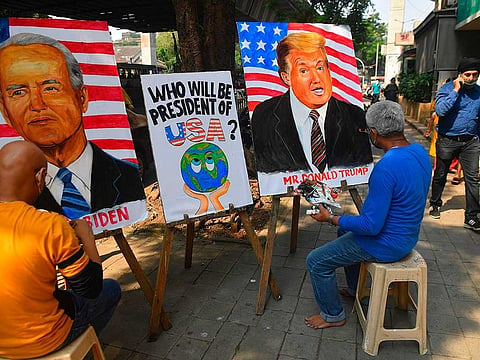US Elections 2020: A new American president in two days
World needs a leader who can provide moral leadership at this extraordinary time

Elections 2020
- The world is going through an unprecedented crisis
- Trump victory is going to pose a bigger challenge for the health and well-being of many Americans
- COVID-19 response and healthcare crisis on people's mind as millions vote in the US
- The new President is expected to bring the US back to the Paris Agreement
The world’s only recognised superpower, the US is tomorrow going to elect its President, who will not only lead the country but also the free world for the next four years. Joe Biden is leading the poll but that does not guarantee his victory. Donald Trump’s departure from the White House is not a foregone conclusion. The democratic institutions and civil society in the US are probably strong to withstand another four years of Trump, but a Trump victory is going to pose a bigger challenge for the health and well-being of the rest of the world, which is going through serious crises of a Covid-19 pandemic, climate change and populist nationalism.
The world is in the middle of a health crisis as it had not witnessed for over a century. While the global economy has almost collapsed, there is no realistic hope of the Covid-19 pandemic ending soon. At this time, the world is in search of a leader who understands the seriousness of this health crisis, respects science, listens to experts, and works to bring countries together to wage a coordinated global struggle for survival and recovery. Unfortunately, Donald Trump has not only failed to adequately and carefully meet the challenges of the pandemic at home, his frequent divisive and accusative utterances about the origin of the virus have divided the world further.
Threat of the pandemic
While the focus of the world for nearly a year is mostly concentrated on the Covid-19 pandemic, the critical threat from rapidly changing climate to the world’s survival has not gone away. The world is becoming warmer much faster than it has ever been in the last 2000 years. If the present trend of greenhouse gas emission continues, the UN Climate Science Panel warns of the possibility of a sea-level rise of almost one meter by 2100.
After years of tough negotiations, 196 countries had agreed at the Paris Climate Conference on 12 December 2015 to adopt the Paris Agreement to address climate change. The success of the international community to negotiate this extremely important agreement was short-lived when President Trump on 2 June 2017 decided to withdraw the US from the historic Paris agreement.
US withdrawal from Paris Agreement
The US withdrawal from the Paris Agreement might add an additional 0.3 Celsius to global warming by the end of this century. Moreover, the agreement is not to cut the carbon emission only but also to provide financial and technological support to poor developing countries for climate mitigation. In these two areas, the pledged contributions of the US and its global leadership are very significant. A new President is expected to bring the US back to the Paris Agreement and this process of return for the survival of the planet cannot wait longer.
The world has been also witnessing for some time an increasing trend of populist nationalism. The election of Donald Trump as the President of the US in 2016 has not only expedited the deterioration of the decision-making process but also legitimised the populist leaders in different parts of the world, and has contributed to the global trend of decline of democracy. The rise of populist nationalism has not only divided the societies further using the ‘we-they’ dichotomy it has also pushed many countries to take restrictive measures against accepting refugees and migrants and has guided the state to not to adhere to rules and norms of multilateralism.
The basic civility and decency in the global public discourse have taken a big hit under Trump presidentship. Global leaders have no inhibition in being directly racist and Islamophobic in their utterances. While Trump leads the pack, there is no moral barrier anymore for the leaders of the other countries to openly violate democratic norms, to infringe the basic human rights, and to disregard basic international laws and norms. Dividing the societies in the name of religion and race has become the favourite tool of their politics.
Destroying the democratic processes
Taking the advantage of Covid-19 crisis, leaders of several countries have not only engaged in destroying the democratic processes and institutions in their countries and suppressing minorities, many of them have also started violent conflicts within and outside their territories. Old wars have been revived in South Asia, Caucasia, and North Africa. The world has become more violent than before and the hope of pandemic-induced peace has been proved to be misplaced, as I had warned in my piece in April 2020. Here.
The world is going through an unprecedented crisis. Hope is fast disappearing. People in large numbers are moving to other areas in search of survival. At this point in time, the world is in serious need of a leader who can provide moral leadership and be able to plan and lead a global coalition in order to meet the survival challenges posed by the raging pandemic, climate catastrophe, and economic decline.
The free world also needs a leader who can be seen with a strong commitment to a liberal political philosophy and can advocate and stand strong to promote and protect basic democratic values. Sadly, Donald Trump has failed to give that moral leadership to the world, and his departure in this election is vital though only Americans have the right to vote for it.
Ashok Swain is a Professor of Peace and Conflict Research, Uppsala University, Sweden.







